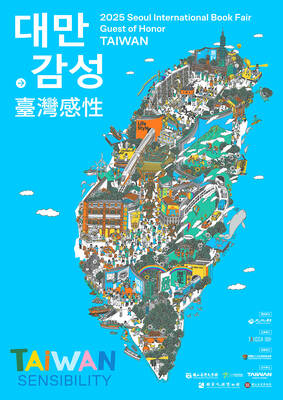Pastry cases
All-purpose flour 300g
Chilled, unsalted butter 175g

Photo: Paul Cooper, Taipei Times
照片:台北時報記者古德謙攝
Egg yolk 1
派皮
冰中筋麵粉 三百公克
無鹽奶油 一百七十五公克
蛋黃 一顆
■ Put the flour into a large bowl. Add a pinch of salt.
■ Dice the butter and add it to the flour. Mix with both hands, until it forms a breadcrumb-like mixture. Continue mixing until the crumbs are roughly the same size.
■ Add the yolk to make a dough. Add a little iced water if required, being careful not too add too much, then knead into a firm dough. Cover and place into the fridge. Chill for at least 30 mins.
■ Break the dough into 12 pieces, then roll out each one with a rolling pin and place into individual pastry tins. Return to fridge for another 30 mins. Pre-heat the oven to 180 degrees Celsius.
■ First fill the pastry cases with pie weights and then put them in the oven. Bake for about 15 mins. Next, remove the pastry cases, take out the weights, and then bake for another 15 mins.
■ 把麵粉放入大碗,然後加上一撮鹽巴。
■ 把無鹽奶油切丁,放入麵粉當中,再用雙手搓揉混合,形成一小塊一小塊的狀態。繼續搓揉到顆粒都差不多大小。
■ 放入蛋黃揉成麵團,若果需要的話,慢慢加一點的冰水,切忌不可加太多,麵團完成後,密封放入冰箱冷藏至少三十分鐘。
■ 麵團分成十二份,再以桿麵杖把每份麵團桿平放進派模,放回冰箱內再冷藏三十分鐘。烤箱預熱一百八十度十分鐘左右。
■ 先把壓派石均勻鋪排在派皮上面,再放入烤箱裡,烤約十五分鐘。接著,拿出派皮,移除壓派石,再烤十五分鐘。
Pumpkin filling
Pumpkin (raw) 600g
Sugar 40g
Eggs 2
Ground cinnamon 1 teaspoon
Milk 100cc
南瓜餡
南瓜 (生) 六百公克
糖 四十公克
雞蛋 兩顆
肉桂粉 一小匙
牛奶 一百毫升
■ Remove the peel from the pumpkin and cube the flesh. Steam until cooked, then mash. Place mashed pumpkin into a large bowl.
■ Add beaten eggs, then add sugar and ground cinnamon, to taste. Mix well.
■ Add milk, mix well. Pour filling into pastry cases.
■ Return to oven and bake for 20 mins. When ready, remove and leave to cool.
■ 南瓜去皮切塊蒸熟,再壓成泥,放入大碗中。
■ 放入已打好的雞蛋,接著依照個人口味添加糖、肉桂粉,並攪拌均勻。
■ 加入牛奶,攪拌均勻後倒入派皮裡。
■ 放回烤箱,烤約二十分鐘,完成後取出放涼。

The 2025 Seoul International Book Fair was held from June 18 to 22 at the COEX Convention & Exhibition Center in Seoul, South Korea. This year, participants from 17 countries attended, with over 530 publishing houses and related organizations taking part. For the first time, Taiwan participated in the book fair as the Guest of Honor, bringing together more than 85 publishers and presenting a curated selection of 550 titles. A delegation of 23 Taiwanese creatives traveled to Seoul to attend the event, including 13 literary authors, six illustrators, and four comic book artists, among which were a film director, an

The new generation born between 2025 and 2039 has been officially named “Generation Beta,” or simply “Gen Beta.” This generation will be the first to experience a world where artificial intelligence (AI) plays a key role in daily life. Generations are defined by shared cultural, social and historical experiences within a specific time frame. These experiences, often influenced by significant events and technological advancements, shape the values, attitudes and behaviors of each generation. The concept of generations helps us understand how different age groups interact with their environment and contribute to societal changes over time. The previous generational transition from Gen

In late 2024, the suicide of acclaimed Taiwanese author Chiung Yao at 86 sparked a societal debate. She expressed her desire to avoid the difficult aging process and sought to govern her own death rather than leave it to fate. Her statements propelled the issue of “euthanasia” back into the public arena, posing the question of whether Taiwan should legalize euthanasia to grant patients and the elderly the right to die with dignity. Euthanasia, the intentional ending of a life to relieve suffering, is legal for humans in countries like the Netherlands and Belgium but remains prohibited in Taiwan.

Continued from yesterday(延續自昨日) https://www.taipeitimes.com/News/lang As Gen Beta grows, they are expected to witness advanced technologies becoming fully integrated into various fields like education, workplaces, healthcare and entertainment. In addition to technological developments, they will also face big challenges like severe climate change. Influenced by their Gen Y or Gen Z parents, who view climate change as a critical issue for the future and prioritize sustainability, they are likely to focus more on global issues and seek innovative solutions to address them. Moreover, Gen Beta will experience considerable demographic changes, such as lower birth rates and longer lifespans. Consequently, Gen Beta is predicted to